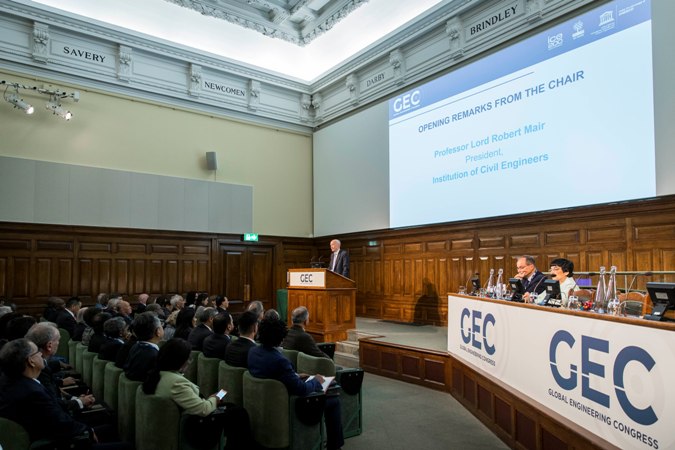

The United Nation’s Sustainable Development Goals (SDGs) outline 17 areas intended to provide “a shared blueprint for peace and prosperity for people and the planet, now and into the future.“ While the degree of cooperation required to address the goals extends across multiple professions and domains, the World Federation of Engineering Organizations (WFEO) have been particularly interested in how engineers can contribute to the important changes the goals outline.
That’s why the SDGs were a key topic of conversation at the recent Global Engineering Congress, organized by the Institution of Civil Engineers, which took place October 22 to 26, 2018 in London, United Kingdom. Delegates from multiple associations and national organizations, including Engineers Canada and the Canadian Society for Civil Engineering, gathered to discuss how the specific work of WFEO’s committees could be tied to the SDGs to provide the organization with improved focus.
One area that generated a great deal of discussion was the topic of women in engineering, an area that presents a wide variety of challenges for countries worldwide. While in Canada, workplace culture and inadequate practices around maternity leave have been identified as some of the key barriers to the retention of women in the engineering professions, in other countries the problems are sometimes much more fundamental, such as basic access to education. The congress provided an opportunity to bring nations facing such issues into conversation and share ideas.
Interestingly, the conference incorporated several non-traditional tools to help generate conversation and spark action. Attendees were invited to download and use the conference app, which allowed participants to discuss topics and pose questions to session moderators that, for various reasons such as language barriers, they may not have felt comfortable raising in the sessions. The organizers also provided an “Action Room” where attendees could pass on ideas to have them logged in a centralized collection.
Jeanette Southwood, FCAE, FEC, LL.D. (h.c.), P.Eng., IntPE, Vice President, Corporate Affairs and Strategic Partnerships for Engineers Canada, presented on 30 by 30, discussing strategy development, the importance of collaboration when tackling complex challenges, and the range of work being done by Engineers Canada and the 30 by 30 Champions to raise the number of women newly licensing as engineers to 30 per cent by 2030.
Following Southwood’s presentation and several others on the same panel, discussion focused on questions of how governments can be enlisted to support the growth of women in engineering, what resources exist that can be shared across the globe, and how to solve some of the logistical problems of program rollout, such as effectively communicating with diverse partners in academia and industry. Notably, the panel chair, Valerie Ifueko Agberagba, also “flipped” the conversation mid-way through the question period, throwing questions out to the audience to generate some particularly rich and engaging conversation. Outcomes included the sharing of successful tactics and metrics used in other parts of the globe that could have application in Canada.
In the conference remarks, Stacey DelVecchio of the American Association of Engineering Societies, commended both Engineers Canada and Engineering New Zealand for making “bold public statements” through their respective programs to improve the recruitment and retention of women in engineering. In a program that resonates with 30 by 30, Engineers News Zealand is aiming for a 20 per cent increase of the number of women in engineering education and professions by 2021.
While many countries around the world had a number of delegates present, one issue noted was the relatively low number of Canadian participants in attendance. By increasing representation from across industry, associations, and academia in the future, Canadians could increase their impact on these important conversations about the profession’s future, while more rapidly spreading the good ideas that other countries have towards how to maintain a healthy, forward-thinking engineering profession.

